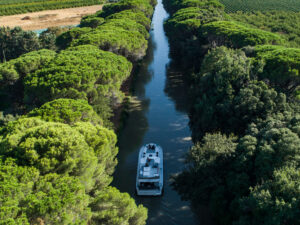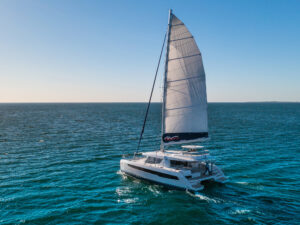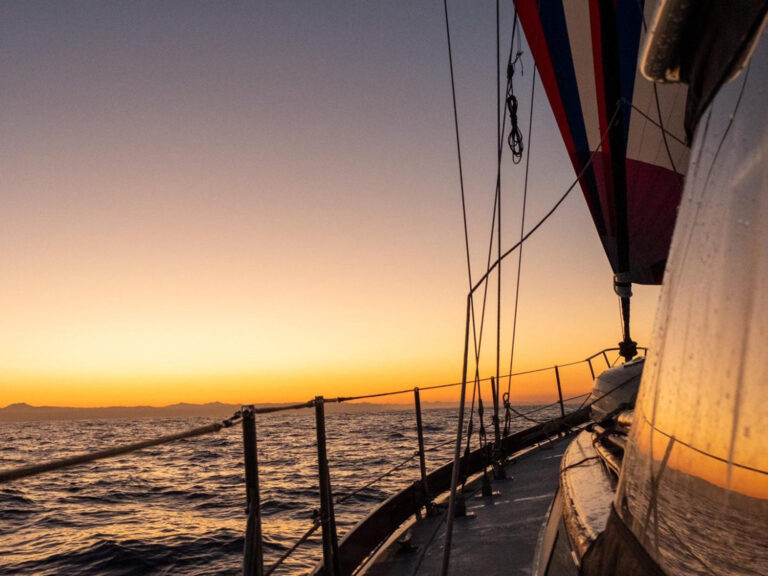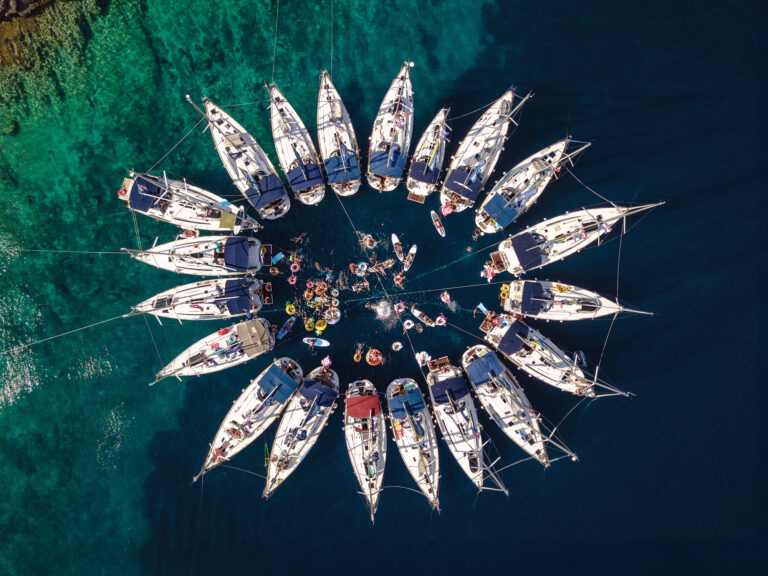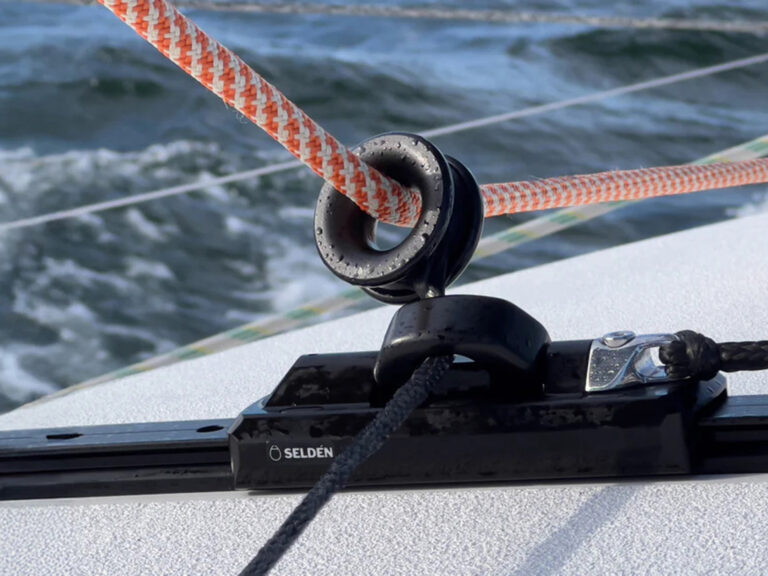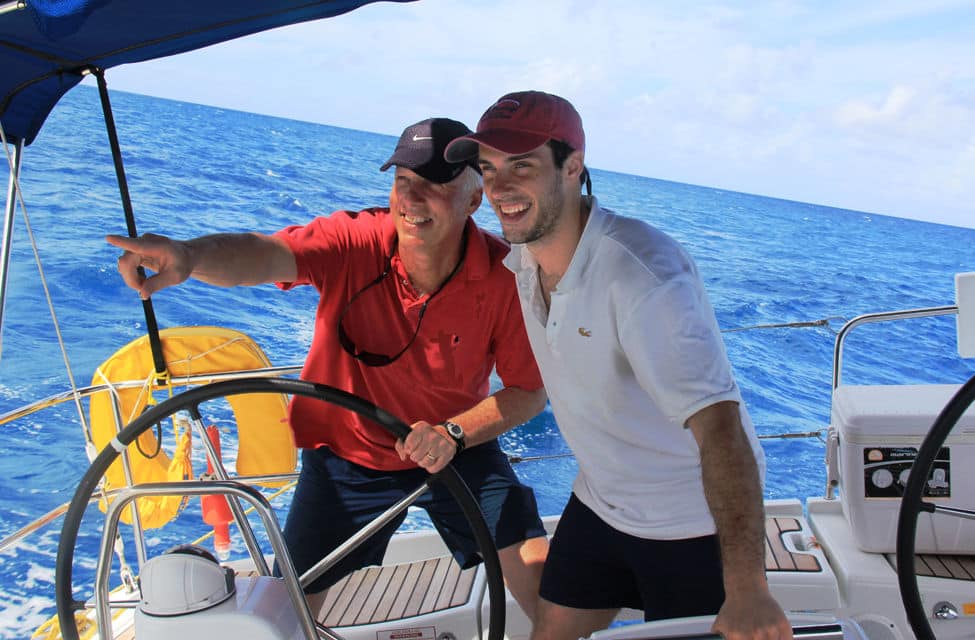
Why Charter?
To foster curiosity and to satisfy it, companies and brokers work hard to demystify the chartering experience and educate potential clients. Companies produce in print and on line a wealth of material to help charterers check off the list of items they need to accomplish before arrival at the base; brokers have chat rooms and eletters promoting fleets and deals; others give away flash drives and DVDs chock full of videos and helpful information. Many companies offer sailing schools and flotillas. Companies can even help charterers plan the complete trip and related activities, from reservations for marina slips to restaurant options and, yes, special event, wedding, and honeymoon packages.
Where and When to Go
As far as deciding when to go, again, much depends on personal circumstances and preferences. Not surprisingly, months designated as high season are usually the most desirable times to sail, not only for reasons of climate and weather in the charter area but also because of the weather back home.
In the Caribbean, for example, summer sailing is superb—the temperature doesn’t vary more than a few degrees from winter to summer. But most sailors want that dose of tropical sun, turquoise water, and balmy trades when the temperature at home is in the single digits and the boat’s laid up in the yard. For this reason, winter prices in the islands are higher than in the low season (summer) or fringe season (the period of time between high season and low season).
High, low, and fringe seasons vary according to locale, but if you’re on a tight budget, off-season or fringe-season sailing can save money; most companies offer substantial discounts or incentives in off-season months. In most areas, you can save from 10 percent to 60 percent.
Are You Ready to Charter?
If you’re a boat owner or sailor who has coastal sailing experience on boats comparable to the one you’re chartering, you should have no problem. For the potential skipper, companies ask for a sailing résumé.
You should be familiar with basic boathandling procedures (including docking and anchoring), know the rules of the road, and be familiar with basic seamanship, navigation, and piloting.
If you’ve achieved certification from a reputable school offering either American Sailing Association or U.S. Sailing courses, companies and brokers want to know, so include that in your sailing résumé. For some international areas, requirements are more formal; check with the company you plan to sail with.
When you arrive at the boat, you’ll receive an orientation from base staff who know the sailing area. They provide an overview of the boat and its systems and of the cruising grounds, including any special navigational notes, desirable areas, restricted areas, and other local knowledge. Before departure, it’s also a good idea to inspect the boat yourself and ask company staff to answer any questions you have.
Before they give you the go-ahead to set sail, most companies will give informal checkouts. If they feel your skills are a little rusty, no problem—they’ll put a skipper on board for all or part of the charter (at your expense). If you’re at all unsure of your skills, it’s painless to hire a captain for the first day or two until you become confident.
There are thousands of bareboats out there, with small and large companies in places near and far where you’ve always dreamed of sailing. So why not take advantage of an opportunity to see the world the easy way?
Types of Charters
Charters fall into two distinct categories: fully crewed—the boat you charter comes complete with a captain and a crew, and bareboat—you’re the captain, and your family and friends make up the crew. Both styles offer distinct advantages.
There’s nothing quite as relaxing and stress-free as a well-organized crewed charter. It’s as if your every whim is answered before it’s even voiced. Drinks appear. Food is served. Destinations come and go.
Want a perfect sunset photograph? Well, sir, here’s the perfect west-facing anchorage for it. Ditto for a snorkeling spot, a wreck dive, or some spanking good breeze.
If the crew’s really good, you never realize that they’re there. They simply seem to be elsewhere until needed, and then they magically reappear. Things aren’t merely thought of; they’re anticipated. There’s never a hassle about navigation, provisions, or vessel maintenance. For a few precious days, your wish really is your crew’s command.
Captain-Only charters lie somewhere between fully crewed and bareboat charters. With just a captain, you as crew are more involved with sailing the boat, but the responsibility ultimately lies with the captain, so the pressure’s off. You also are involved in provisioning, cooking, cleaning; usually, you also pay for and provide the captain’s meals.
Bareboat charters means that you and your crew are fully responsible for safely operating the boat and navigating successfully in unfamiliar waters. Meeting these new challenges will improve your skills. Along with the responsibilities entailed on a bareboat charter comes unlimited freedom—freedom to do exactly as you wish, when you wish, how you wish. Bareboating is like owning a boat for a week, with all the joys and agonies that ownership entails.
Bareboat flotillas, such as those conducted by King Yacht Charters, as well as those organized by other charter companies, lie somewhere in the middle. In a flotilla charter, a group of bareboaters agree upon a single itinerary. The Kings, who broker crewed and bareboat sailing vacations in addition to conducting the CW program, take care of some of the details of provisioning and itinerary and act as navigational guides during your weeklong sailing adventure. You’re part of the crew on your own boat, and it’s a great opportunity for people of mixed skill levels to participate and learn.
Flotillas are particularly appealing to first-time bareboaters, who, while competent to handle the particular vessel, aren’t as comfortable with the navigational, social, and safety aspects of chartering in an unfamiliar destination.
Realize that with groups come disadvantages (your course and schedule aren’t completely your own) and advantages (instant camaraderie, for example). The choice is yours.

